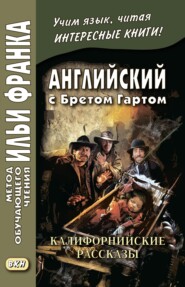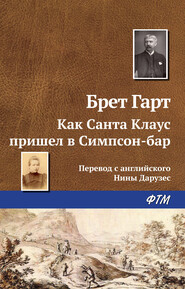По всем вопросам обращайтесь на: info@litportal.ru
(©) 2003-2024.
✖
Gabriel Conroy
Автор
Год написания книги
2017
Настройки чтения
Размер шрифта
Высота строк
Поля
Perhaps no one was better calculated or more accustomed to impress the stranger with this belief than Mr. Peter Dumphy, banker and capitalist. His outspoken faith in the present and future of California was unbounded. His sincere convictions that no country or climate was ever before so signally favoured, his intoleration of any criticism or belief to the contrary, made him a representative man. So positive and unmistakable was his habitual expression on these subjects, that it was impossible to remain long in his presence without becoming impressed with the idea that any other condition of society, climate, or civilization than that which obtained in California, was a mistake. Strangers were brought early to imbibe from this fountain; timid and weak Californians, in danger of a relapse, had their faith renewed and their eyesight restored by bathing in this pool that Mr. Dumphy kept always replenished. Unconsciously, people at last got to echoing Mr. Dumphy's views as their own, and much of the large praise that appeared in newspapers, public speeches, and correspondence, was first voiced by Dumphy. It must not be supposed that Mr. Dumphy's positiveness of statement and peremptory manner were at all injurious to his social reputation. Owing to that suspicion with which most frontier communities regard polite concession and suavity of method, Mr. Dumphy's brusque frankness was always accepted as genuine. "You always know what Pete Dumphy means," was the average criticism. "He ain't goin' to lie to please any man." To a conceit that was so freely and shamelessly expressed as to make hesitating and cautious wisdom appear weak and unmanly beside it, Mr. Dumphy added the rare quality of perfect unconscientiousness unmixed with any adulterating virtue. It was with such rare combative qualities as these that Mr. Dumphy sat that morning in his private office and generally opposed the fog without, or rather its influence upon his patrons and society at large. The face he offered to it was a strong one, although superficially smooth, for since the reader had the honour of his acquaintance, he had shaved off his beard, as a probably unnecessary indication of character. It was still early, but he had already despatched much business with that prompt decision which made even an occasional blunder seem heroic. He was signing a letter that one of his clerks had brought him, when he said briskly, without looking up – "Send Mr. Ramirez in."
Mr. Ramirez, who had already called for three successive days without obtaining an audience of Dumphy, entered the private room with an excited sense of having been wronged, which, however, instantly disappeared, as far as external manifestation was concerned, on his contact with the hard-headed, aggressive, and prompt Dumphy.
"How do?" said Dumphy, without looking up from his desk. Mr. Ramirez uttered some objection to the weather, and then took a seat uneasily near Dumphy. "Go on," said Dumphy, "I can listen."
"It is I who came to listen," said Mr. Ramirez, with great suavity. "It is of the news I would hear."
"Yes," said Mr. Dumphy, signing his name rapidly to several documents, "Yes, Yes, Yes." He finished them, turned rapidly upon Ramirez, and said "Yes!" again, in such a positive manner as to utterly shipwreck that gentleman's self-control. "Ramirez!" said Dumphy abruptly, "how much have you got in that thing?"
Mr. Ramirez, still floating on a sea of conjecture, could only say, "Eh! Ah! It is what?"
"How deep are you? How much would you lose?"
Mr. Ramirez endeavoured to fix his eyes upon Dumphy's. "How – much – would I lose? – if how? If what?"
"What – money – have – you – got – in – it?" said Mr. Dumphy, emphasising each word sharply with the blunt end of his pen on the desk.
"No money! I have much interest in the success of Madame Devarges!"
"Then you're not 'in' much! That's lucky for you. Read that letter. – Show him in!"
The last remark was in reply to a mumbled interrogatory of the clerk, who had just entered. Perhaps it was lucky for Mr. Ramirez that Mr. Dumphy's absorption with his new visitor prevented his observation of his previous visitor's face. As he read the letter, Ramirez's face first turned to an ashen-grey hue, then to a livid purple, then he smacked his dry lips thrice, and said "Carámba!" then with burning eyes he turned towards Dumphy.
"You have read this?" he asked, shaking the letter towards Dumphy.
"One moment," interrupted Dumphy, finishing the conversation with his latest visitor, and following him to the door. "Yes," he continued, returning to his desk and facing Ramirez. "Yes!" Mr. Ramirez could only shake the letter and smile in a ghastly way at Dumphy. "Yes," said Dumphy, reaching forward and coolly taking the letter out of Ramirez's hand, "Yes. Seems she is going to get married," he continued, consulting the letter. "Going to marry the brother, the man in possession. That puts you all right; any way, the cat jumps; and it lets you out." With the air of having finished the interview, Mr. Dumphy quietly returned the letter, followed by Ramirez's glaring eyes, to a pigeon-hole in his desk, and tapped his desk with his penholder.
"And you – you?" gasped Ramirez hoarsely, "you?"
"Oh, I didn't go into it a dollar. Yet it was a good investment. She could have made out a strong case. You had possession of the deed or will, hadn't you? There was no evidence of the existence of the other woman," continued Mr. Dumphy, in his usually loud voice, overlooking the cautionary gestures of Mr. Ramirez with perfect indifference. "Hello! How do?" he added to another visitor. "I was sending you a note." Mr. Ramirez rose. His long finger nails were buried in the yellow flesh of his palms. His face was quite bloodless, and his lips were dry. "What's your hurry?" said Dumphy, looking up. "Come in again; there's another matter I want you to look into, Ramirez! We've got some money out on claim that ought to have one or two essential papers to make it right. I daresay they're lying round somewhere where you can find 'em. Draw on me for the expense." Mr. Dumphy did not say this slyly, nor with any dark significance, but with perfect frankness. Virtually it said – "You're a scamp, so am I; whether or not this other man who overhears us is one likewise, it matters not." He took his seat again, turned to the latest comer, and became oblivious of his previous companion.
Luckily for Mr. Ramirez, when he reached the street he had recovered the control of his features, if not his natural colour. At least the fog, which seemed to lend a bluish-grey shade to all complexions, allowed his own livid cheek to pass unnoticed. He walked quickly, and it appeared almost unconsciously towards the water, for it was not until he reached the steamboat wharf that he knew where he was. He seemed to have taken one step from Mr. Dumphy's office to the pier. There was nothing between these two objects in his consciousness. The interval was utterly annihilated. The steamboat did not leave for Sacramento until eight that evening, and it was only ten o'clock now. He had been conscious of this as he walked, but he could not have resisted this one movement, even if a futile one, towards the object of his revengeful frenzy. Ten hours to wait – ten hours to be passive, inactive – to be doing nothing! How could he pass the time? He could sharpen his knife. He could buy a new one. He could purchase a better pistol. He remembered passing a gunsmith's shop with a display of glittering weapons in its window. He retraced his steps, and entered the shop, spending some moments in turning over the gunsmith's various wares. Especially was he fascinated by a long broad-bladed bowie-knife. "My own make," said the tradesman, with professional pride, passing a broad, leathery thumb along the keen edge of the blade. "It'll split a half-dollar. See!"
He threw a half-dollar on the counter, and with a quick, straight, down-darting stab pierced it in halves. Mr. Ramirez was pleased, and professed a desire to make the experiment himself. But the point slipped, sending the half-dollar across the shop and cutting a long splintering furrow in the counter. "Yer narves ain't steady. And ye try too hard," said the man, coolly. "Thet's the way it's apt to be with you gents. Ye jest work yourself up into a fever 'bout a little thing like thet, ez if everything depended on it. Don't make sich a big thing of it. Take it easy like this," and with a quick, firm, workmanlike stroke the tradesman repeated the act successfully. Mr. Ramirez bought the knife. As the man wrapped it up in paper, he remarked with philosophic kindness – "I wouldn't try to do it agin this mornin'. It's early in the day, and I've noticed thet gents ez hez been runnin' free all night ain't apt to do theirselves justice next mornin'. Take it quietly alone by yourself, this arternoon; don't think you're goin' to do anythin' big, and you'll fetch it, sure!"
When Mr. Ramirez was in the street again he looked at his watch. Eleven o'clock! Only one hour gone. He buttoned his coat tightly over the knife in his breast pocket, and started on again feverishly. Twelve o'clock found him rambling over the sand hills near the Mission Dolores. In one of the by-streets he came upon a woman looking so like the one that filled all his thoughts, that he turned to look at her again with a glance so full of malevolence that she turned from him in terror. This circumstance, his agitation, and the continual dryness of his lips sent him into a saloon, where he drank freely, without, however, increasing or abating his excitement. When he returned to the crowded streets again he walked quickly, imagining that his manner was noticed by others, in such intervals as he snatched from the contemplation of a single intention. There were several ways of doing it. One was to tax her with her deceit and then kill her in the tempest of his indignation. Another and a more favourable thought was to surprise her and her new accomplice – for Mr. Ramirez, after the manner of most jealous reasoners, never gave her credit for any higher motive than that she had shown to him – and kill them both. Another and a later idea was to spend the strength of his murderous passion upon the man, and then to enjoy her discomfiture, the failure of her plans, and perhaps her appeals for forgiveness. But it would still be two days before he could reach them. Perhaps they were already married. Perhaps they would be gone! In all this wild, passionate, and tumultuous contemplation of an effect, there never had been for a single moment in his mind the least doubt of the adequacy of the cause. That he was a dupe, – a hopeless, helpless dupe, – was sufficient. Since he had read the letter, his self-consciousness had centred upon a single thought, expressed to him in a single native word, "Bobo." It was continually before his eyes. He spelled it on the signs in the street. It kept up a dull monotonous echo in his ears. "Bobo." Ah! she should see!
It was past noon, and the fog had deepened. Afar from the bay came the sounds of bells and whistles. If the steamer should not go? If she should be delayed, as often happened, for several hours? He would go down to the wharf and inquire. In the meantime, let the devil seize the fog! Might the Holy St. Bartholomew damn for ever the cowardly dog of a captain and the coyote crew who would refuse to go! He came sharply enough down Commercial Street, and then, when opposite the Arcade Saloon, with the instinct that leads desperate men into desperate places, he entered and glared vindictively around him. The immense room, bright with lights and glittering with gilding and mirrors, seemed quiet and grave in contrast with the busy thoroughfare without. It was still too early for the usual habitués of the place; only a few of the long gambling tables were occupied. There was only a single monte bank "open," and to this Ramirez bent his steps with the peculiar predilections of his race. It so chanced that Mr. Jack Hamlin was temporarily in charge of the interests of this bank, and was dealing in a listless, perfunctory manner. It may be parenthetically remarked that his own game was faro. His present position was one of pure friendliness to the absent dealer, who was taking his dinner above stairs. Ramirez flung a piece of gold on the table and lost. Again he attempted fortune and lost. He lost the third time. Then his pent-up feelings found vent in the characteristic "Carámba!" Mr. Jack Hamlin looked up. It was not the oath, it was not the expression of ill-humour, both of which were common enough in Mr. Hamlin's experience, but a certain distinguishing quality in the voice which awoke Jack's peculiarly retentive memory. He looked up, and, to borrow his own dialect, at once "spotted" the owner of the voice. He made no outward sign of his recognition, but quietly pursued the game. In the next deal Mr. Ramirez won! Mr. Hamlin quietly extended his croupe and raked down Mr. Ramirez's money with the losers'.
As Mr. Hamlin doubtless had fully expected, Mr. Ramirez rose with a passionate scream of rage. Whereat Mr. Hamlin coolly pushed back Mr. Ramirez's stake and winnings without looking up. Leaving it upon the table, Ramirez leaped to the gambler's side.
"You would insult me, so! You would ch – ee – at! eh? You would take my money, so!" he said, hoarsely, gesticulating passionately with one hand, while with the other he grasped as wildly in his breast.
Mr. Jack Hamlin turned a pair of dark eyes on the speaker, and said, quietly, "Sit down, Johnny!"
With the pent-up passion of the last few hours boiling in his blood, with the murderous intent of the morning still darkling in his mind, with the passionate sense of a new insult stinging him to madness, Mr. Ramirez should have struck the gambler to the earth. Possibly that was his intention as he crossed to his side; possibly that was his conviction as he heard himself —he– Victor Ramirez! whose presence in two days should strike terror to two hearts in One Horse Gulch! – addressed as Johnny! But he looked into the eyes of Mr. Hamlin and hesitated. What he saw there I cannot say. They were handsome eyes, clear and well opened, and had been considered by several members of a fond and confiding sex as peculiarly arch and tender. But, it must be confessed, Mr. Ramirez returned to his seat without doing anything.
"Ye don't know that man," said Mr. Hamlin to the two players nearest him, in a tone of the deepest confidence, which was, however, singularly enough, to be heard distinctly by every one at the table, including Ramirez. "You don't know him, but I do! He's a desprit character," continued Mr. Hamlin, glancing at him and quietly shuffling the cards, "a very desprit character! Make your game, gentlemen! Keeps a cattle ranch in Sonoma, and a private graveyard whar he buries his own dead. They call him the 'Yaller Hawk of Sonoma.' He's outer sorts jest now: probably jest killed some one up thar, and smells blood." Mr. Ramirez smiled a ghastly smile, and affected to examine the game minutely and critically as Mr. Hamlin paused to rake in the gold. "He's artful – is Johnny!" continued Mr. Hamlin, in the interval of shuffling, "artful and sly! Partikerly when he's after blood! See him sittin' thar and smilin'. He doesn't want to interrupt the game. He knows, gentlemen, thet in five minutes from now, Jim will be back here and I'll be free. Thet's what he's waitin' for! Thet's what's the matter with the 'Yaller Slaughterer of Sonoma!' Got his knife ready in his breast, too. Done up in brown paper to keep it clean. He's mighty pertikler 'bout his weppins is Johnny. Hez a knife for every new man." Ramirez rose with an attempt at jocularity, and pocketed his gains. Mr. Hamlin affected not to notice him until he was about to leave the table. "He's goin' to wait for me outside," he exclaimed. "In five minutes, Johnny," he called to Ramirez's retreating figure. "If you can't wait, I'll expect to see you at the Marysville Hotel next week, Room No. 95, the next room, Johnny, the next room!"
The Mr. Ramirez who reached the busy thoroughfare again was so different from the Mr. Ramirez who twenty minutes before had entered the Arcade that his identity might have easily been doubted. He did not even breathe in the same way; his cheek, although haggard, had resumed its colour; his eyes, which hitherto had been fixed and contemplative, had returned to their usual restless vivacity. With the exception that at first he walked quickly on leaving the saloon, and once or twice hurriedly turned to see if anybody were following him, his manner was totally changed. And this without effusion of blood, or the indulgence of an insatiable desire for revenge! As I prefer to deal with Mr. Ramirez without affecting to know any more of that gentleman than he did himself, I am unable to explain any more clearly than he did to himself the reason for this change in his manner, or the utter subjection of his murderous passion. When it is remembered that for several hours he had had unlimited indulgence, without opposition, in his own instincts, but that for the last twenty minutes he had some reason to doubt their omnipotence, perhaps some explanation may be adduced. I only know that by half-past six Mr. Ramirez had settled in his mind that physical punishment of his enemies was not the most efficacious means of revenge, and that at half-past seven he had concluded not to take the Sacramento boat. And yet for the previous six hours I have reason to believe that Mr. Ramirez was as sincere a murderer as ever suffered the penalty of his act, or to whom circumstances had not offered a Mr. Hamlin to at upon a constitutional cowardice.
Mr. Ramirez proceeded leisurely down Montgomery Street until he came to Pacific Street. At the corner of the street his way was for a moment stopped by a rattling team and waggon that dashed off through the fog in the direction of the wharf. Mr. Ramirez recognised the express and mail for the Sacramento boat. But Mr. Ramirez did not know that the express contained a letter which ran as follows —
"Dear Madam, – Yours of the 10th received, and contents noted. Am willing to make our services contingent upon your success. We believe your present course will be quite as satisfactory as the plan you first proposed. Would advise you not to give a personal interview to Mr. Ramirez, but refer him to Mr. Gabriel Conroy. Mr. Ramirez's manner is such as to lead us to suppose that he might offer violence, unless withheld by the presence of a third party. – Yours respectfully,
"Peter Dumphy."
CHAPTER II.
A CLOUD OF WITNESSES
The street into which Ramirez plunged at first sight appeared almost impassable, and but for a certain regularity in the parallels of irregular, oddly-built houses, its original intention as a thoroughfare might have been open to grave doubt. It was dirty, it was muddy, it was ill-lighted; it was rocky and precipitous in some places, and sandy and monotonous in others. The grade had been changed two or three times, and each time apparently for the worse, but always with a noble disregard for the dwellings, which were invariably treated as an accident in the original design, or as obstacles to be overcome at any hazard. The near result of this large intent was to isolate some houses completely, to render others utterly inaccessible except by scaling ladders, and to produce the general impression that they were begun at the top and built down. The remoter effect was to place the locality under a social ban, and work a kind of outlawry among the inhabitants. Several of the houses were originally occupied by the Spanish native Californians, who, with the conservative instincts of their race, still clung to their casas after the Americans had flown to pastures new and less rocky and inaccessible beyond. Their vacant places were again filled by other native Californians, through that social law which draws the members of an inferior and politically degraded race into gregarious solitude and isolation, and the locality became known as the Spanish Quarter. That they lived in houses utterly inconsistent with their habits and tastes, that they affected a locality utterly foreign to their inclinations or customs, was not the least pathetic and grotesque element to a contemplative observer.
Before, or rather beneath one of these structures, Mr. Ramirez stopped, and began the ascent of a long flight of wooden steps, that at last brought him to the foundations of the dwelling. Another equally long exterior staircase brought him at last to the verandah or gallery of the second story, the first being partly hidden by an embankment. Here Mr. Ramirez discovered another flight of narrower steps leading down to a platform before the front door. It was open. In the hall-way two or three dark-faced men were lounging, smoking cigaritos, and enjoying, in spite of the fog, the apparently unsociable négligé of shirt sleeves and no collars. At the open front windows of the parlour two or three women were sitting, clad in the lightest and whitest of flounced muslin skirts, with heavy shawls over their heads and shoulders, as if summer had stopped at their waists, like an equator.
The house was feebly lighted, or rather the gloom of yellowish-browned walls and dark furniture, from which all lustre and polish had been smoked, made it seem darker. Nearly every room and all the piazzas were dim with the yellow haze of burning cigaritos. There were light brown stains on the shirt sleeves of the men, there were yellowish streaks on the otherwise spotless skirts of the women; every masculine and feminine forefinger and thumb was steeped to its first joint with yellow. The fumes of burnt paper and tobacco permeated the whole house like some religious incense, through which occasionally struggled an inspiration of red peppers and garlic.
Two or three of the loungers addressed Ramirez in terms of grave recognition. One of the women – the stoutest – appeared at the doorway, holding her shawl tightly over her shoulders with one hand, as if to conceal a dangerous dishabille above the waist and playfully shaking a black fan at the young man with the other hand, applied to him the various epithets of "Ingrate," "Traitor," and "Judas," with great vivacity and volubility. Then she faced him coquettishly. "And after so long, whence now, thou little blackguard?"
"It is of business my heart and soul," exclaimed Ramirez, with hasty and somewhat perfunctory gallantry. "Who is above?" – "Those who testify."
"And Don Pedro?"
"He is there, and the Señor Perkins."
"Good. I will go on after a little," he nodded apologetically, as he hastily ascended the staircase. On the first landing above he paused, turned doubtfully toward the nearest door, and knocked hesitatingly. There was no response. Ramirez knocked again more sharply and decidedly. This resulted in a quick rattling of the lock, the sudden opening of the door, and the abrupt appearance of a man in ragged alpaca coat and frayed trousers. He stared fiercely at Ramirez, said in English, "What in h – ! next door!" and as abruptly slammed the door in Ramirez's face. Ramirez entered hastily the room indicated by the savage stranger, and was at once greeted by a dense cloud of smoke and the sound of welcoming voices.
Around a long table covered with quaint-looking legal papers, maps, and parchments, a half-dozen men were seated. The greater number were past the middle age, dark-featured and grizzle-haired, and one, whose wrinkled face was the colour and texture of red-wood bark, was bowed with decrepitude.
"He had one hundred and two years day before yesterday. He is the principal witness to Micheltorrena's signature in the Castro claim," exclaimed Don Pedro.
"Is he able to remember?" asked Ramirez.
"Who knows?" said Don Pedro, shrugging his shoulder. "He will swear; it is enough!"
"What animal have we in the next room?" asked Ramirez. "Is it wolf or bear?"
"The Señor Perkins," said Don Pedro.
"Why is he?"
"He translates."
Here Ramirez related, with some vehemence how he mistook the room, and the stranger's brusque salutation. The company listened attentively and even respectfully. An American audience would have laughed. The present company did not alter their serious demeanour; a breach of politeness to a stranger was a matter of grave importance even to these doubtful characters. Don Pedro explained —
"Ah, so it is believed that God has visited him here." He tapped his forehead. "He is not of their country fashion at all. He has punctuality, he has secrecy, he has the habitude. When strikes the clock three he is here; when it strikes nine he is gone. Six hours to work in that room! Ah, heavens! The quantity of work – it is astounding! Folios! Volumes! Good! it is done. Punctually at nine of the night he takes up a paper left on his desk by his padrone, in which is enwrapped ten dollars – the golden eagle, and he departs for that day. They tell to me that five dollars is gone at the gambling table, but no more! then five dollars for subsistence – always the same. Always! Always! He is a scholar – so profound, so admirable! He has the Spanish, the French, perfect. He is worth his weight in gold to the lawyers – you understand – but they cannot use him. To them he says – 'I translate, lies or what not! Who knows? I care not – but no more.' He is wonderful!"
The allusion to the gaming-table revived Victor's recollection, and his intention in his present visit. "Thou hast told me, Don Pedro," he said, lowering his voice in confidence, "how much is fashioned the testimony of the witnesses in regard of the old land grants by the Governors and Alcaldes. Good. Is it so?"

















